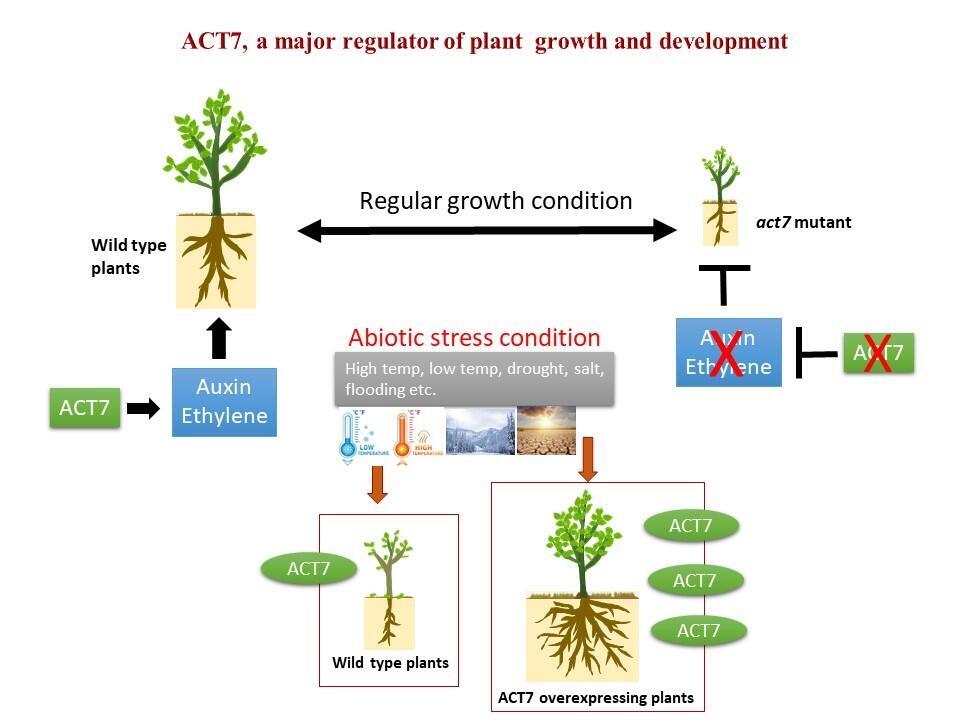- Target
- Contacts
- Access
- Document Request
- Language

【PRESS RELEASE】Actin7 (ACT7) has been identified as the major regulator of plant development

The research group of Dr. Abidur Rahman of Department of Plant Bio Sciences at Faculty of Agriculture, Iwate University identified ACT7 protein as the key regulator of plant root development. The research group includes Takahiro Numata, Faculty of Agriculture, Graduate School of Integrated Arts and Sciences, Iwate University, Kenji Sugita, The United Graduate School of Agricultural Sciences, Iwate University, Dr. Arifa Ahamed Rahman, The United Graduate School of Agricultural Sciences, Iwate University, and led by Dr. Abidur Rahman, Department of Plant Bio Sciences, Faculty of Agriculture, Iwate University.
Optimal growth and development and yield of plants/crops depend on the proper development of roots as roots provide required nutrients and water from soil. Additionally, under various abiotic stresses like temperature stress, drought stress, salt stress and flood, the root growth is severely inhibited which ultimately affects the growth of the whole plant/crop resulting in reduced crop yield. By 2050, the world population will increase to 9.1 billion, while there will be only a 5% increase in agricultural land (www.fao.org) Additionally, because of climate change, plants will encounter various abiotic stresses more frequently than ever before, which will limit crop productivity world-wide (IPCC report, 2018). Hence, to feed the increased population, and to reach the goal number 2 of SDGs (No Hunger), it is imperative to develop abiotic stress resilient plants/crops of future. To this end, understanding the mechanism of root development is the first step towards fulfilling the goal. In this study, the research group identified one of the actin isovariants ACT7, as the key regulatory protein that controls the root development using model plant Arabidopsis thaliana. ACT7 protein is a highly conserved protein and performs the same function across the plant species, suggesting that this finding can help the scientists around the world to develop plants/crops with stronger root system architecture, which will have a potential impact on future agriculture and food production.
The results of this research have been published in the scientific journal "Journal of Experimental Botany (2021 IF-6.99; 5 yr. IF-7.86)" published by Society of Experimental Biology and Oxford University Press (UK) on June 24, 2022 (Japan time/ advance publication).
Highlights of the research
(1) Identified one of the plant actin proteins, ACT7, a highly conserved protein across the plant/crop species as the key regulator of root development.
(2) Demonstrated that ACT7 is required for proper functionality of two plant hormones auxin and ethylene, which play important roles in regulating root development.
(3) Since this protein is highly conserved across the plant/crop species and performs the same function, it is expected that plants/crops with stronger root system can be developed by manipulating this single gene, which will help to develop abiotic stress resilient plants of future and contribute to world-agriculture.
Publication
Journal:Journal of Experimental Botany (Oxford University Press, UK)
Title:Actin isovariant ACT7 controls root meristem development in Arabidopsis through modulating auxin and ethylene responses
Authors:
Takahiro Numata- Faculty of Agriculture, Graduate School of Integrated Arts and Sciences, Iwate University- Master student (graduated)
Kenji Sugita- Faculty of Agriculture, United graduate School of Agricultural Sciences, Iwate University-Ph.D. student (2nd year)
Arifa Ahamed Rahman- The United graduate School of Agricultural Sciences, Iwate University-Specially appointed Associate Professor
Abidur Rahman- Department of Plant Bio Sciences, Faculty of Agriculture, Iwate University, and The United graduate School of Agricultural Sciences, Iwate University- Associate Professor
Publication date:2022. 6. 24 (advance publication)
DOI: https://doi.org/10.1093/jxb/erac280
URL:
https://academic.oup.com/jxb/advance-article/doi/10.1093/jxb/erac280/6617659?guestAccessKey=c863b02a-87f4-47f8-a193-9ae0d4960665
Funding:
?JSPS Kakenhi JSPS Kakenhi (Kiban B-Grant Number 23012003, Iwate University, Abidur Rahman, Associate Professor).
Abstract:
Meristem is the most functionally dynamic part in a plant body. The shaping of the meristem requires constant cell division and cell elongation, which are influenced by hormones and cell cytoskeletal component, actin. Although the roles of hormones in modulating meristem development have been extensively studied, the role of actin in this process is still elusive. Using the single and double mutants of the vegetative class actin, we demonstrate that actin isovariant ACT7 plays a key role in root meristem development. In absence of ACT7, but not ACT8 and ACT2, depolymerization of actin was observed. Consistently, act7 mutant showed reduced cell division, cell elongation, and meristem length. Intracellular distribution and trafficking of auxin transport proteins in the actin mutants revealed that ACT7 specifically functions in root meristem to facilitate the trafficking of auxin efflux carriers PIN1 and PIN2, and consequently the transport of auxin. Compared with act7, act7act8 double mutant shows slightly enhanced phenotypic response and altered intracellular trafficking. The altered distribution of auxin in act7 and act7act8 affects the response of the roots to ethylene but not to cytokinin. Collectively, our results suggest that ACT7 dependent auxin-ethylene response plays a key role in controlling Arabidopsis root meristem development.




